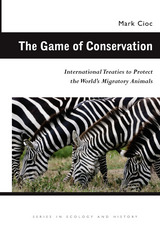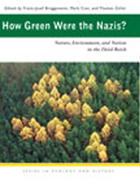
The Game of Conservation is a brilliantly crafted and highly readable examination of nature protection around the world.
Twentieth-century nature conservation treaties often originated as attempts to regulate the pace of killing rather than as attempts to protect animal habitat. Some were prompted by major breakthroughs in firearm techniques, such as the invention of the elephant gun and grenade harpoons, but agricultural development was at least as important as hunting regulations in determining the fate of migratory species. The treaties had many defects, yet they also served the goal of conservation to good effect, often saving key species from complete extermination and sometimes keeping the population numbers at viable levels. It is because of these treaties that Africa is dotted with large national parks, that North America has an extensive network of bird refuges, and that there are any whales left in the oceans. All of these treaties are still in effect today, and all continue to influence nature-protection efforts around the globe.
Drawing on a wide variety of primary and secondary sources, Mark Cioc shows that a handful of treaties—all designed to protect the world’s most commercially important migratory species—have largely shaped the contours of global nature conservation over the past century. The scope of the book ranges from the African savannahs and the skies of North America to the frigid waters of the Antarctic.

Environmentalists and conservationists in Germany welcomed the rise of the Nazi regime with open arms, for the most part, and hoped that it would bring about legal and institutional changes. However, environmentalists soon realized that the rhetorical attention that they received from the regime did not always translate into action. By the late 1930s, nature and the environment became less pressing concerns as Nazi Germany prepared and executed its extensive war.
Based on prodigious archival research, and written by some of the most important scholars in the field of twentieth-century German history, How Green Were the Nazis? illuminates the ideological overlap between Nazi ideas and conservationist agendas. Moreover, this landmark book underscores that the “green” policies of the Nazis were more than a mere episode or aberration in environmental history.((BLURB))---"The environmental ideas, policies, and consequences of the Nazi regime pose controversial questions that have long begged for authoritative answers. At last, a team of highly qualified scholars has tackled these questions, with dispassionate judgment and deep research. Their assessment will stand for years to come as the fundamental work on the subject—and provides a new angle of vision on 20th-century Europe's most disruptive force."—John McNeill, author of Something New Under the Sun: An Environmental History of the Twentieth-Century World---EDITORS---Franz-Josef Brueggemeier is a professor of history at the university of Freiburg, Germany. He has published extensively in the field of environmental history in nineteenth- and twentieth-century Europe.Mark Cioc is a professor of history at the University of California, Santa Cruz, and editor of the journal Environmental History. He is the author of The Rhine: An Eco-Biography, 1815-2000. Thomas Zeller is an assistant professor in the department of history at the University of Maryland, College Park. He is the author of Straße, Bahn, Panorama, translated as Driving Germany.
READERS
Browse our collection.
PUBLISHERS
See BiblioVault's publisher services.
STUDENT SERVICES
Files for college accessibility offices.
UChicago Accessibility Resources
home | accessibility | search | about | contact us
BiblioVault ® 2001 - 2024
The University of Chicago Press









